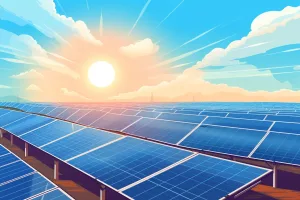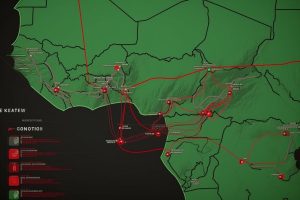Eskom, South Africa’s main electricity provider, is facing tough times in an ongoing energy crisis. With power outages called load shedding becoming a regular part of life, the company struggles to meet its energy goals, recording a low energy availability factor of just 60.6% for 2025. Despite efforts to improve maintenance and reduce reliance on expensive diesel, challenges like high debt and outdated infrastructure make it hard for Eskom to keep the lights on. However, there’s a glimmer of hope as renewable energy projects and efficiency improvements show promise for a brighter future.
South Africa is facing a tough energy crisis, with frequent power outages and problems at its main electricity provider, Eskom. Recently, the government assured people that these issues would be resolved soon. Despite the challenges, including old power stations and technical failures, there is hope as leaders work on solutions to stabilize the power supply. The journey ahead is not easy, but there’s a strong commitment to creating a brighter and more reliable energy future for everyone in the country.
South Africa is facing a tough energy crisis, with power cuts called load shedding hitting families and businesses hard. Minister Kgosientsho Ramokgopa recently apologized for these blackouts, expressing hope for a better future. While some people appreciated his honesty, others doubted that quick fixes would work, given the long history of power problems. The government is now working on big changes to improve the energy system, promising to explore new technologies and involve the public in finding solutions. With collaboration and creativity, South Africa aims to turn its energy woes into a success story.
South Africa is undergoing a tough energy crisis, with frequent power cuts known as load shedding. Key issues include the shutdown of important coal power stations, problems with the aging energy infrastructure, and a heavy reliance on a single energy company, Eskom. Political parties are voicing their frustration, demanding better management and more competition in the energy sector. As the country grapples with these challenges, the future of its energy supply hangs in the balance, requiring innovative solutions and teamwork. The journey to a stable energy future is not just about power; it’s a fight for hope and progress for all South Africans.
The Hessequa Municipality in South Africa plans to combat the energy crisis in the booming town of Riversdale with a R210 million renewable energy project that aims to generate 15 million kilowatthours yearly. The project includes a solar photovoltaic system, a battery energy storage system, and monitoring and control systems, designed to provide a reliable backup during periods of high electricity demand. The initiative is expected to enhance public safety, vital services, and minimize economic losses for businesses while establishing a benchmark for other areas worldwide grappling with similar energy challenges.
Local governments play a crucial role in addressing the energy crisis by providing solutions and collaborating with the Western Cape Government (WCG). Municipalities are responsible for service delivery, which is severely impacted during power blackouts. To combat the crisis, provinces must focus on protecting essential services and seeking alternative sources of energy.
The Western Cape Department of Agriculture is taking steps to address the energy crisis facing the agriculture sector in the region. The recent Energy Summit held in Rawsonville brought together various stakeholders, including farmers, energy experts, and officials, to find innovative solutions to the challenge.
As the winter season fast approaches, South Africa braces for a surge in energy demand, which further intensifies the pressure on the stateowned power company, Eskom. Eskom has cautioned about the possible occurrence of power outages to forestall an entire collapse of the national grid.
Enlit Africa is a highly respected conference and exhibition that recently shone a light on Cape Town, highlighting the city’s focus on innovative energy solutions. Held from May 16th to 18th at the Cape Town International Convention Centre (CTICC), the event brought together a diverse group of stakeholders, including businesses, consultants, developers, and analysts representing various countries. Together, they worked towards contributing to Africa’s vision for a ‘Just Energy Transition’ and addressing South Africa’s energy crisis.
In the midst of South Africa’s ongoing energy crisis, the city of Cape Town is leading the way in efforts to combat loadshedding and create a more sustainable future for its citizens. At a recent SmallScale Embedded Generation (SSEG) event, Mayoral Committee Member for Energy, Councillor Beverley van Reenen, outlined the city’s ambitious plans.
Minister Gwede Mantashe delivered the Mineral Resources and Energy Department’s comprehensive Budget Vote Speech, outlining the achievements and strategies for South Africa’s mining and energy sectors amidst various global and domestic challenges. ### Focus Areas
The current energy crisis in South Africa has forced citizens to consider alternative energy sources to minimize the impact of power outages on their daily lives. In response to this issue, Western Cape Premier Alan Winde proposed incentivizing solar energy installations for both homeowners and businesses during the 10th Energy Digicon.
Today, on World Facilities Management Day, we recognize the professionals who work tirelessly to maintain the health, safety, and productivity of an organization’s facilities. In Cape Town, the ongoing energy crisis has presented numerous challenges for the City’s Facilities Management Department. However, the department has implemented various strategies to ensure the continuity of services for both staff and the public.
South Africa faces an alarming energy crisis, with citizens experiencing daily blackouts for up to 10 hours due to current Stage 6 load shedding. The situation is becoming increasingly severe as Stage 9 and beyond protocols are being finalized, leaving citizens and experts alike profoundly concerned about the future.
South Africa is currently facing an energy crisis that has led to extended power outages in the form of Stage 6 blackouts lasting for 810 hours a day. To make matters worse, the Democratic Alliance (DA) has revealed that protocols for Stage 9 loadshedding and beyond are being finalized, a development the party describes as “nothing short of horrifying.”
South Africa has been grappling with frequent power blackouts, forcing the government to seek alternative solutions to address the power crisis. In a bid to focus on the potential of renewable energy sources, Premier Alan Winde recently hosted the 9th Energy Digicon in the Western Cape province.
















